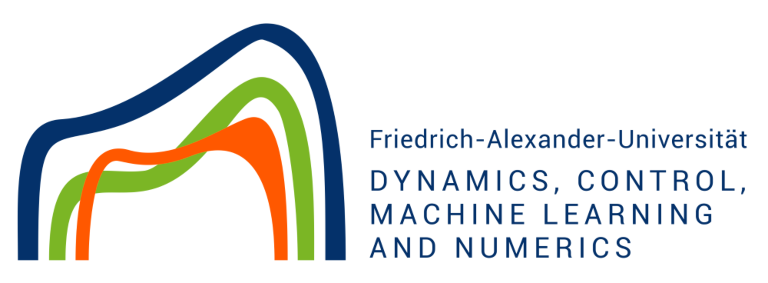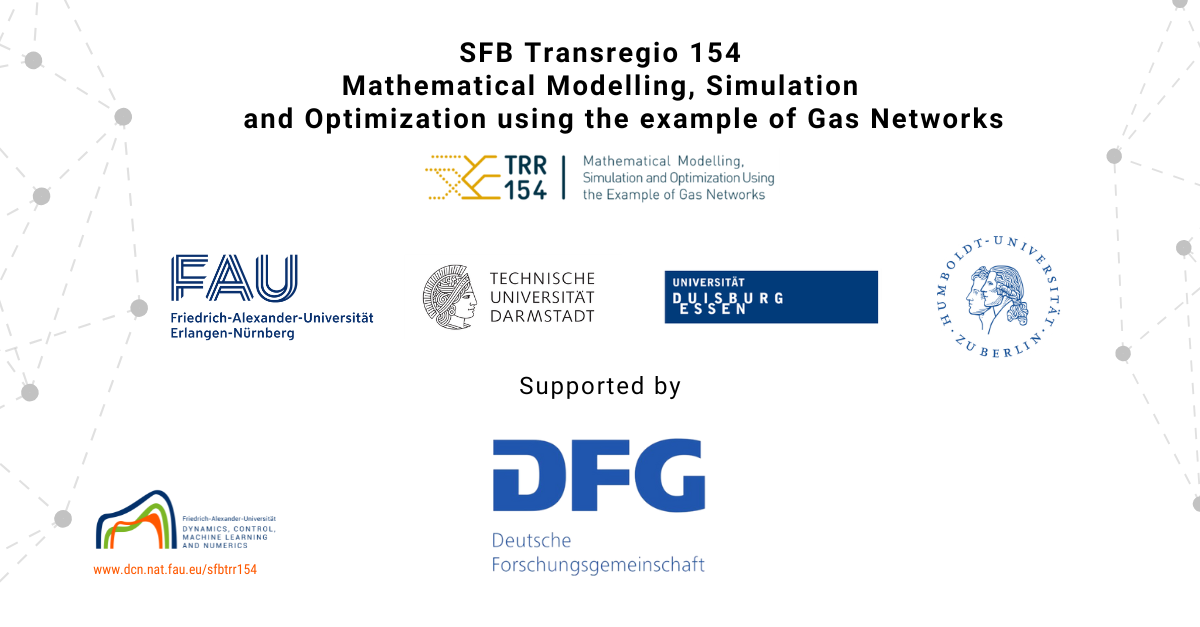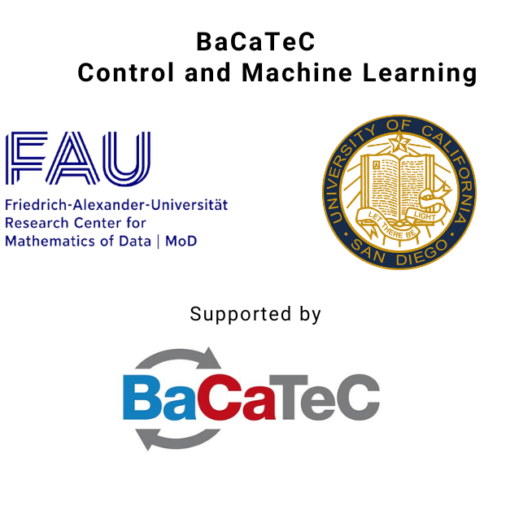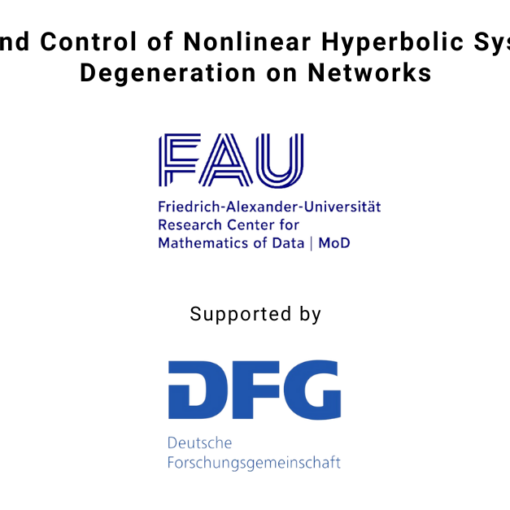SFB Transregio 154
Mathematical Modelling, Simulation and Optimization using the example of Gas Networks
- Project: TRR 154 – SFB Transregio 154
- Project/grant No.:239904186
- Supported by DFG (Deutsche Forschungsgemeinschaft/ German Research Foundation)
- Duration: 2018 – 2026
SFB TRR154 Transregio – Mathematical modelling, simulation and optimization using the example of gas networks is focused to provide certified novel answers to these grand challenges, based on mathematical modeling, simulation and optimization. Given the amount of data and the potential of stochastic effects, this is a formidable task all by itself, regardless from the actual process of distributing the proper amount of gas with the required quality to the customer.
In order to achieve this goal new paradigms in the integration of these disciplines and in particular in the interplay between integer and nonlinear programming in the context of stochastic data have to be established and brought to bear. Clearly, without a specified underlying structure of the problems to face, such a breakthrough is rather unlikely. Thus, the particular network structure, the given hierarchical hybrid modeling in terms of switching algebraic, ordinary and partial differential-algebraic equations of hyperbolic type that is present in gas network transportation systems gives rise to the confidence that the challenges can be met by the team of the proposed Transregio-CRC.
TRR154 subprojects
C03: Nodal control and the turnpike phenomenon (since 2014 | 2022 – 2026)
PI: Martin Gugat (FAU), Rüdiger Schultz (University of Duisburg-Essen)
This project at DFG
Turnpike results provide connections between the solutions of transient and the corresponding stationary optimal control problems that are often used as models in the control of gas transport networks. In this way turnpike
results give a theoretical foundation for the approximation of transient optimal controls by the solutions of stationary optimal control problems that have a simpler structure. Turnpike studies can also be considered as
investigations of the structure of the transient optimal controls. In the best case the stationary optimal controls approximate the transient optimal controls exponentially fast.
C05: Observer-based data assimilation for time dependent flows on gas networks (since 2019)
PI: Martin Gugat (FAU), Jan Giesselmann (TU Darmstadt)
This project at DFG
This project studies data assimilation methods for models of compressible flows in gas networks. The basic idea of data assimilation is to include measurement data into simulations during runtime in order to make their results
more precise and more reliable. This can be achieved by augmenting the original model equations with control terms at nodes and on pipes that steer the solutions towards the measured data. This gives rise to a new system
called “observer”. This project is going to explore how much data is needed so that convergence of the observer towards the solution of the original system can be guaranteed, how fast this convergence is and how measurement
errors affect the solution.
C07: Random Batch Methods for Optimal Control of Network Dynamics (2022 – 2026)
PI: Falk Hante (Humboldt-Universität zu Berlin), Enrique Zuazua (FAU)
This project at DFG
This project focuses on hyperbolic and parabolic dynamics on networks and random batch methods for control. The aim is to restrict the overall network dynamics to subgraphs as a random batch for the computation of a stochastic gradient descent direction. We aim to develop a convergence theory and develop control methodologies of gas networks employing techniques of model predictive control. This approach can then readily be extended to incorporate uncertainties in the model by adapting concepts from the theory of simultaneous control of parameter-dependent systems.
Efficient Simulation and Optimal Control of Large-scale Hyperbolic Networks (September 2024 – February 2025)
Internal subproject.
Contact: Yue Wang, Enrique Zuazua (FAU)
Uncertainty
We analyze the (stationary and transient) gas transport with uncertain boundary data. This leads to optimization problems with probabilistic constraints. Our main methods to work with probabilistic constrained optimization
problems are the spheric-radial decomposition and kernel-density estimation.
Read more at TRR154 project site
Efficient Simulation and Optimal Control of Large-scale Hyperbolic Networks
Internal subprojects at TRR154 (September 1, 2024 – February 28, 2025)
People involved
Publications
- K. Liu, E. Zuazua (2025) Representation and Regression Problems in Neural Networks: Relaxation, Generalization, and Numerics, Math. Models Methods Appl. Sci., https://arxiv.org/html/2412.01619v1
- M. Gugat (2025) Boundary stabilization of quasi-linear hyperbolic systems with varying time delay, SIAM Journal on Control and Optimization, Vol. 63, No. 1, pp. 452-471. https://doi.org/10.1137/24M1648570
- Z. Li, Z. Wang, E. Zuazua (2025) A Potential Game Perspective in Federated Learning, https://dx.doi.org/10.48550/arXiv.2411.11793
- Y. Song, Z. Wang, E. Zuazua (2025) FedADMM-InSa: An Inexact and Self-Adaptive ADMM for Federated Learning, Neural Networks, Vol. 181, No. 106772, ISSN: 0893-6080, DOI: 10.1016/j.neunet.2024.106772
- Z. Li, K. Liu, L. Liverani, E. Zuazua (2025) Universal Approximation of Dynamical Systems by Semi-Autonomous Neural ODEs and Applications
- Z. Wang, E. Zuazua (2025) Approximate and Weighted Data Reconstruction Attack in Federated Learning
- A. Alcalde, G. Fantuzzi, E. Zuazua (2025) Exact Sequence Classification with Hardmax Transformers, https://arxiv.org/abs/2502.02270
- T. Crin-Barat, N. De Nitti, E. Zuazua (2025) On the decay of one-dimensional locally and partially dissipative hyperbolic systems, ESAIM:COCV, https://arxiv.org/abs/2206.00555
- F. Zakaria, I. Ftouhi, E. Zuazua (2025) Optimal L^p-approximation of convex sets by convex subsets, https://arxiv.org/abs/2501.00928
- M. Hernandez, E. Zuazua (2025) Deep Neural Networks: Multi-Classification and Universal Approximation, https://arxiv.org/abs/2409.06555v1
- M. Gugat, M. Schuster, J. Sokolowski (2024) The location problem for compressor stations in pipeline networks, Mathematics and Mechanics of Complex Systems, Vol. 12, No. 4, pp. 507–546, https://doi.org/10.2140/memocs.2024.12.507
- D. Ruiz-Balet, E. Zuazua (2024) Pattern control via diffusion interaction
- M. Gugat (2024) Stabilization of a cyclic network of strings by nodal control, Journal of Evolution Equations, Vol. 25, No. 4, https://doi.org/10.1007/s00028-024-01030-0
- M. Hernandez, E. Zuazua (2024) Uniform Turnpike Property and Singular Limits, Acta Appl Math, Vol. 190, No. 3, https://doi.org/10.1007/s10440-024-00640-7
- A. Alcalde, G. Fantuzzi, E. Zuazua (2024) Clustering in Pure-Attention Hardmax Transformers and its Role in Sentiment Analysis
- M. Hernandez, M. Lazar, S. Zamorano (2024) Averaged observations and turnpike phenomenon for parameter-dependent systems, https://arxiv.org/pdf/2404.17455
- B. Dehman, E. Zuazua (2024) Boundary sidewise observability of the wave equation, J. Eur. Math. Soc. (JEMS)
- A. Ulke, M. Schuster, S. Göttlich (2024) Steady State Blended Gas Flow on Networks: Existence and Uniqueness of Solutions
- M. Schuster (2024) On the Convergence of Optimization Problems with Kernel Density Estimated Probabilistic Constraints
- D.W.M. Veldman, E. Zuazua (2024) Local Stability and Convergence of Unconstrained Model Predictive Control
- S. Zamorano, E. Zuazua (2024) Tracking controllability for finite-dimensional linear systems
- N. De Nitti, D. Serre, E. Zuazua (2024) Pointwise constraints for scalar conservation laws with positive wave velocity
- Z. Wang, Y. Song, E. Zuazua (2024) Approximate and Weighted Data Reconstruction Attack in Federated Learning, arXiv:2308.06822
- C. Esteve, B. Geshkovski, D. Pighin, E. Zuazua (2024) Large-time asymptotics in deep learning, hal-02912516
- G. Wang, Y. Zhang, E. Zuazua (2024) Observability for heat equations with time-dependent analytic memory, Arch Rational Mech Anal, Vol. 248, No. 115, https://doi.org/10.1007/s00205-024-02058-9
- E. Zuazua (2024) Progress and future directions in machine learning through control theory Proceedings book FGS 2024, pp. 116, https://hdl.handle.net/10651/74677
- A. Alvarez-Lopez, R. Orive-Illera, E. Zuazua (2024) Optimized classification with Neural ODEs via separability, Neural Networks, Vol. 180, 106640, arXiv:2312.13807
- D.W.M. Veldman, A. Borkowski, E. Zuazua (2024) Stability and Convergence of a Randomized Model Predictive Control Strategy, IEEE Trans. Automat., Vol. 69, No. 9, pp. 6253-6260, 10.1109/TAC.2024.3375253
- A. Alvarez-Lopez, A. Hadj Slimane, E. Zuazua (2024) Interplay between depth and width for interpolation in neural ODEs, Neural Networks, Vol. 180, pp. 106-640, https://doi.org/10.1016/j.neunet.2024.106640, ISSN 0893-6080, arXiv.2401.09902
- J. Lecarós, J. Lopez-Rios, G.I. Montecinos, E. Zuazua (2024) Optimal control approach for moving bottom detection in one-dimensional shallow waters by surface measurements, Math. Meth. Appl. Sci., pp. 1–32, https://doi.org/10.1002/mma.10251
- T. Crin-Barat, L-Y. Shou, E. Zuazua (2024) Large time asymptotics for partially dissipative hyperbolic systems without Fourier analysis: application to the nonlinearly damped p-system, Ann. Inst. Henri Poincare (C) Anal. Non Lineaire, https://doi.org/10.4171/aihpc/128
- M. Lazar, E. Zuazua (2024) Eigenvalue bounds for the Gramian operator of the heat equation, Automatica, Vol. 164, pp. 111-653, https://doi.org/10.1016/j.automatica.2024.111653
- E. Zuazua (2024) Fourier series and sidewise control of 1-d waves, Volume in honor of Yves Meyer, Documents Mathématiques of the French Mathematical Society (SMF), Vol. 22, p. 341-365, arXiv:2308.04906
- GM. Coclite, N. De Nitti, F. Maddalena, G. Orlando, E. Zuazua. (2024) Exponential convergence to steady-states for trajectories of a damped dynamical system modelling adhesive strings, M3AS
- F. Della Pietra, G. Fantuzzi, L. Ignat, A.L. Masiello, E. Zuazua (2024) Finite element approximation of the Hardy constant. J. Convex Anal. – Special Issue Giuseppe Buttazzo 70
- D. Ruiz-Balet, E. Zuazua (2024) Control of neural transport for normalising flows. J. Math. Pures Appl., Vol. 181, pp. 58-90, ISSN 0021-7824. https://doi.org/10.1016/j.matpur.2023.10.005
- U. Biccari, Y. Song, X. Yuan, E. Zuazua (2024) A Two-Stage Numerical Approach for the Sparse Initial Source Identification of a Diffusion-Advection Equation, Inverse Problems, IP-103963, https://arxiv.org/abs/2202.01589
- M. Hernandez, R. Lecaros, S. Zamorano (2023) Averaged turnpike property for differential equations with random constant coefficients, Mathematical Control and Related Fields, Vol. 13, No. 2, pp. 808-832, https://doi.org/10.3934/mcrf.2022016
2026
- :
Synchronization of velocities in pipeline flow of blended gas
In: Journal of Mathematical Analysis and Applications 556 (2026), Article No.: 130078
ISSN: 0022-247X
DOI: 10.1016/j.jmaa.2025.130078
BibTeX: Download
2025
- :
Boundary stabilization of quasi-linear hyperbolic systems with varying time delay
In: SIAM Journal on Control and Optimization 63 (2025), p. 452--471
ISSN: 0363-0129
DOI: 10.1137/24M1648570
BibTeX: Download - :
Stabilization of a cyclic network of strings by nodal control
In: Journal of Evolution Equations 25 (2025), Article No.: 4
ISSN: 1424-3199
DOI: 10.1007/s00028-024-01030-0
BibTeX: Download
2024
- :
New Lyapunov functions for systems with source terms
In: Control and Cybernetics 53 (2024), p. 163-187
ISSN: 0324-8569
DOI: 10.2478/candc-2024-008
URL: https://sciendo.com/de/article/10.2478/candc-2024-0008
BibTeX: Download - :
The Finite-Time Turnpike Property in Machine Learning
In: MDPI Machines 12 (2024), Article No.: 705
ISSN: 2075-1702
DOI: 10.3390/machines12100705
URL: https://www.mdpi.com/2075-1702/12/10/705
BibTeX: Download - , :
An Observer for Pipeline Flow with Hydrogen Blending in Gas Networks: Exponential Synchronization
In: SIAM Journal on Control and Optimization 62 (2024), p. 2273-2296
ISSN: 0363-0129
DOI: 10.1137/23M1563840
URL: https://epubs.siam.org/doi/10.1137/23M1563840
BibTeX: Download - , , :
Observer-based data assimilation for barotropic gas transport using distributed measurements
In: Communications in Mathematical Sciences 22 (2024), p. 2271-2309
ISSN: 1539-6746
DOI: 10.4310/CMS.240918203214
BibTeX: Download - , , :
System State Estimation for Gas Flows Using Observers Based on Density Measurements
In: Carlos Parés, Manuel J. Castro, Tomás Morales de Luna, María Luz Muñoz-Ruiz (ed.): Hyperbolic Problems: Theory, Numerics, Applications. Volume II, Cham, Switzerland: Springer Nature, 2024, p. 359-369 (SEMA SIMAI Springer Series, Vol.Volume 35)
DOI: 10.1007/978-3-031-55264-9_31
BibTeX: Download - , , :
The turnpike property for mean-field optimal control problems
In: European Journal of Applied Mathematics (2024), p. 1-15
ISSN: 0956-7925
DOI: 10.1017/S0956792524000044
BibTeX: Download - , , , :
The turnpike property for high-dimensional interacting agent systems in discrete time
In: Optimal Control Applications & Methods (2024)
ISSN: 0143-2087
DOI: 10.1002/oca.3172
URL: https://onlinelibrary.wiley.com/doi/10.1002/oca.3172
BibTeX: Download - , , :
The location problem for compressor stations in pipeline networks
In: Mathematics and Mechanics of Complex Systems 12 (2024), p. 507–546
ISSN: 2326-7186
DOI: 10.2140/memocs.2024.12.507
BibTeX: Download - , , , :
Network Design and Control: Shape and Topology Optimization for the Turnpike Property for the Wave Equation
In: Journal of Geometric Analysis 34 (2024), Article No.: 273
ISSN: 1050-6926
DOI: 10.1007/s12220-024-01712-8
URL: https://link.springer.com/article/10.1007/s12220-024-01712-8
BibTeX: Download - , , :
Constrained exact boundary controllability of a quasilinear model for pipeline gas flow
In: Applicable Analysis (2024)
ISSN: 0003-6811
DOI: 10.1080/00036811.2024.2432529
BibTeX: Download - , :
Optimal Neumann control of the wave equation with L1-control cost: the finite-time turnpike property
In: Optimization (2024)
ISSN: 0233-1934
DOI: 10.1080/02331934.2024.2373904
BibTeX: Download
2023
- , , , :
Constrained exact boundary controllability of a semilinear model for pipeline gas flow
In: European Journal of Applied Mathematics (2023), p. 1-22
ISSN: 0956-7925
DOI: 10.1017/S0956792522000389
URL: https://www.cambridge.org/core/journals/european-journal-of-applied-mathematics/article/abs/constrained-exact-boundary-controllability-of-a-semilinear-model-for-pipeline-gas-flow/FD1A8672AEC80D0C3CA20780787E45A7
BibTeX: Download - , , :
A Turnpike Property for Optimal Control Problems with Dynamic Probabilistic Constraints
In: Journal of Convex Analysis 30 (2023), p. 1025--1052
ISSN: 0944-6532
URL: https://www.heldermann.de/JCA/JCA30/JCA303/jca30047.htm
BibTeX: Download - , :
Turnpike properties of optimal boundary control problems with random linear hyperbolic systems
In: Esaim-Control Optimisation and Calculus of Variations 29 (2023), Article No.: 55
ISSN: 1292-8119
DOI: 10.1051/cocv/2023051
URL: https://www.esaim-cocv.org/articles/cocv/abs/2023/01/cocv220028/cocv220028.html
BibTeX: Download - , , :
Limits of stabilization of a networked hyperbolic system with a circle
In: Control and Cybernetics 52 (2023), p. 79-121
ISSN: 0324-8569
DOI: 10.2478/candc-2023-0033
URL: http://control.ibspan.waw.pl:3000/contents/list?year=2023
BibTeX: Download - , :
Optimal Control Problems without Terminal Constraints: The Turnpike Property with Interior Decay
In: International Journal of Applied Mathematics and Computer Science 33 (2023), p. 429–438
ISSN: 1641-876X
DOI: 10.34768/amcs-2023-0031
URL: https://www.amcs.uz.zgora.pl/?action=paper&paper=1715
BibTeX: Download - , :
Turnpike properties for partially uncontrollable systems
In: Automatica 149 (2023)
ISSN: 0005-1098
DOI: 10.1016/j.automatica.2022.110844
BibTeX: Download - , , :
Topological derivative method for control of wave equation on networks
27th International Conference on Methods and Models in Automation and Robotics (MMAR) (Międzyzdroje, August 22, 2023 - August 25, 2023)
In: IEEE Xplore (ed.): 2023 27th International Conference on Methods and Models in Automation and Robotics 2023
DOI: 10.1109/MMAR58394.2023.10242484
BibTeX: Download - , , :
A Dynamic Multilevel Model of the European Gas Market
In: Communications in Optimization Theory 11 (2023), p. 1-26
ISSN: 2051-2953
DOI: 10.23952/cot.2023.11
BibTeX: Download - , :
An aspect of the turnpike property. Long time horizon behavior
In: Serdica Mathematical Journal 49 (2023), p. 127-154
ISSN: 1310-6600
DOI: 10.55630/serdica.2023.49.127-154
URL: https://serdica.math.bas.bg/index.php/serdica/article/view/39
BibTeX: Download
2022
- , , , :
Stabilization of forming processes using multi-dimensional Hamilton-Jacobi equations
IEEE 61st Conference on Decision and Control (CDC) (Cancun, MEXICO)
In: 2022 IEEE 61ST CONFERENCE ON DECISION AND CONTROL (CDC), NEW YORK: 2022
DOI: 10.1109/CDC51059.2022.9992941
BibTeX: Download - :
Optimal boundary control of the wave equation: the finite-time turnpike phenomenon
In: Mathematical Reports 24 (2022), p. 179-186
ISSN: 1582-3067
Open Access: http://imar.ro/journals/Mathematical_Reports/Pdfs/2022/1-2/10.pdf
URL: http://imar.ro/journals/Mathematical_Reports/Pdfs/2022/1-2/10.pdf
BibTeX: Download - , :
Limits of stabilizability for a semilinear model for gas pipeline flow
In: Roland Herzog, Matthias Heinkenschloss, Dante Kalise, Georg Stadler und Emmanuel Trélat (ed.): Optimization and Control for Partial Differential Equations, De Gruyter, 2022, p. 59-71 (Radon Series on Computational and Applied Mathematics, Vol.29)
ISBN: 9783110695984
DOI: 10.1515/9783110695984-003
BibTeX: Download - , :
Modeling, control, and numerics of gas networks
In: E. Trelat, E. Zuazua (ed.): Handbook of Numerical Analysis, Elsevier, 2022 (Handbook of Numerical Analysis)
DOI: 10.1016/bs.hna.2021.12.002
BibTeX: Download - , , , :
Probabilistic constrained optimization on flow networks
In: Optimization and Engineering 23 (2022), p. 1--50
ISSN: 1389-4420
DOI: 10.1007/s11081-021-09619-x
BibTeX: Download - , :
On problems of dynamic optimal nodal control for gas networks
In: Pure and Applied Functional Analysis 5 (2022), p. 1699-1715
ISSN: 2189-3764
URL: http://yokohamapublishers.jp/online2/oppafa/vol7/p1699.html
BibTeX: Download - , , :
Optimal Control for ODEs and PDEs: The Turnpike Phenomenon
65th Joint Conference on Automatic Control (Utsunomiya, November 12, 2022 - November 13, 2022)
In: Extended Abstracts of the 65th Joint Conference on Automatic Control 2022
BibTeX: Download - , :
Max-p Optimal Boundary Control of Gas Flow
25th International Symposium on Mathematical Theory of Networks and Systems (MTNS 2022) (Bayreuth, September 12, 2022 - September 16, 2022)
In: Baumann, Michael Heinrich; Grüne, Lars; Jacob, Birgit; Worthmann, Karl (ed.): Extended Abstracts presented at the 25th International Symposium on Mathematical Theory of Networks and Systems MTNS 2022 2022
DOI: 10.15495/EPub_UBT_00006809
BibTeX: Download
2021
- :
On the turnpike property with interior decay for optimal control problems
In: Mathematics of Control Signals and Systems (2021)
ISSN: 0932-4194
DOI: 10.1007/s00498-021-00280-4
BibTeX: Download - , :
Boundary feedback stabilization of a semilinear model for the flow in star-shaped gas networks
In: Esaim-Control Optimisation and Calculus of Variations 27 (2021), Article No.: 67
ISSN: 1292-8119
DOI: 10.1051/cocv/2021061
BibTeX: Download - , , :
Exponential synchronization of a nodal observer for a semilinear model for the flow in gas networks
In: IMA Journal of Mathematical Control and Information (2021)
ISSN: 0265-0754
DOI: 10.1093/imamci/dnab029
URL: https://academic.oup.com/imamci/advance-article/doi/10.1093/imamci/dnab029/6371370
BibTeX: Download - , , :
Transient gas pipeline flow: analytical examples, numerical simulation and a comparison to the quasi-static approach
In: Optimization and Engineering (2021)
ISSN: 1389-4420
DOI: 10.1007/s11081-021-09690-4
BibTeX: Download - , , :
The Finite-Time Turnpike Phenomenon for Optimal Control Problems: Stabilization by Non-smooth Tracking Terms
In: Grigory Sklyar, Alexander Zuyev (ed.): Stabilization of Distributed Parameter Systems: Design Methods and Applications, Springer Science and Business Media Deutschland GmbH, 2021, p. 17-41 (SEMA SIMAI Springer Series, Vol.2)
ISBN: 978-3-030-61742-4
DOI: 10.1007/978-3-030-61742-4_2
BibTeX: Download - , :
Nodal Stabilization of the Flow in a Network with a Cycle
In: Journal of Optimization, Differential Equations and Their Applications (2021)
ISSN: 2312-4547
DOI: 10.15421/1421O6
URL: https://model-dnu.dp.ua/index.php/SM/article/view/159/0
BibTeX: Download - , , :
The Finite-Time Turnpike Phenomenonfor Optimal Control Problems:Stabilization by Non-smooth TrackingTerms
In: Grigory Sklyar, Alexander Zuyev (ed.): Stabilization of Distributed Parameter Systems: Design Methods and Applications, 6330 Cham, Switzerland: Springer Nature Switzerland AG.The registered company address is: Gewerbestrasse 11, 6330 Cham, Switzerland, 2021, p. 17-41 (SEMA SIMAI Springer SeriesICIAM 2019 SEMA SIMAI Springer Series, Vol.2)
DOI: 10.1007/978-3-030-61742-4
BibTeX: Download
2020
- , , , , , , , , , , :
Joint model of probabilistic/robust (probust) constraints with application to gas network optimization
In: Vietnam Journal of Mathematics (2020)
ISSN: 0866-7179
DOI: 10.1007/s10013-020-00434-y
URL: https://link.springer.com/article/10.1007/s10013-020-00434-y
BibTeX: Download
(Techreport) - , , , :
Optimal Neumann Boundary Control of a Vibrating String with Uncertain Initial Data and Probabilistic Terminal Constraints
In: SIAM Journal on Control and Optimization 58 (2020), p. 2288-2311
ISSN: 0363-0129
DOI: 10.1137/19M1269944
BibTeX: Download - , , :
Closed loop control of gas flow in a pipe: stability for a transient model
In: At-Automatisierungstechnik 68 (2020), p. 1001-1010
ISSN: 0178-2312
DOI: 10.1515/auto-2020-0071
BibTeX: Download - , :
A New Model for Transient Flow in Gas Transportation Networks
In: Pammy Manchanda; René Pierre Lozi; Abul Hasan Siddiqi (ed.): Mathematical Modelling, Optimization, Analytic and Numerical Solutions, Singapore: Springer Nature, 2020, p. 147-156 (Industrial and Applied Mathematics book series (INAMA))
ISBN: 978-981-15-0927-8
DOI: 10.1007/978-981-15-0928-5
BibTeX: Download - , , :
Exponential Stability for the Schlogl System by Pyragas Feedback
In: Vietnam Journal of Mathematics (2020)
ISSN: 0866-7179
DOI: 10.1007/s10013-020-00382-7
BibTeX: Download - , , :
CONVEXITY AND STARSHAPEDNESS OF FEASIBLE SETS IN STATIONARY FLOW NETWORKS
In: Networks and Heterogeneous Media 15 (2020), p. 171-195
ISSN: 1556-1801
DOI: 10.3934/nhm.2020008
BibTeX: Download
2019
- :
A turnpike result for convex hyperbolic optimal boundary control problems
In: Pure and Applied Functional Analysis 4 (2019), p. 849-866
ISSN: 2189-3764
Open Access: http://www.ybook.co.jp/online2/oppafa/vol4/p849.html
URL: http://www.ybook.co.jp/online2/oppafa/vol4/p849.html
BibTeX: Download - :
Exact controllability of a string to rest with a moving boundary
In: Control and Cybernetics 48 (2019), p. 69-87
ISSN: 0324-8569
BibTeX: Download - , :
On the limits of stabilizability for networks of strings
In: Systems & Control Letters 131 (2019), Article No.: 104494
ISSN: 0167-6911
DOI: 10.1016/j.sysconle.2019.104494
BibTeX: Download - , :
ON THE TURNPIKE PHENOMENON FOR OPTIMAL BOUNDARY CONTROL PROBLEMS WITH HYPERBOLIC SYSTEMS
In: SIAM Journal on Control and Optimization 57 (2019), p. 264-289
ISSN: 0363-0129
DOI: 10.1137/17M1134470
BibTeX: Download
2018
- , , , , , :
MIP-based instantaneous control of mixed-integer PDE-constrained gas transport problems
In: Computational Optimization and Applications 70 (2018), p. 267-294
ISSN: 0926-6003
DOI: 10.1007/s10589-017-9970-1
BibTeX: Download - , , , , , :
Towards Simulation Based Mixed-Integer Optimization with Differential Equations
In: Networks 72 (2018), p. 60-83
ISSN: 0028-3045
DOI: 10.1002/net.21812
URL: https://onlinelibrary.wiley.com/doi/abs/10.1002/net.21812
BibTeX: Download
(Techreport) - , , :
Boundary stabilization of quasilinear hyperbolic systems of balance laws: exponential decay for small source terms
In: Journal of Evolution Equations (2018)
ISSN: 1424-3199
DOI: 10.1007/s00028-018-0449-z
URL: https://link.springer.com/article/10.1007/s00028-018-0449-z
BibTeX: Download - , :
Boundary Feedback Stabilization of the Isothermal Euler Equations with Uncertain Boundary Data
In: SIAM Journal on Control and Optimization 56 (2018), p. 1491–1507
ISSN: 0363-0129
DOI: 10.1137/16M1090156
BibTeX: Download - , :
Stationary Gas Networks with Compressor Control and Random Loads: Optimization with Probabilistic Constraints
In: Mathematical Problems in Engineering 2018 (2018), Article No.: Article ID 7984079
ISSN: 1024-123X
DOI: 10.1155/2018/7984079
URL: https://www.hindawi.com/journals/mpe/2018/7984079/
BibTeX: Download - , :
DYNAMIC BOUNDARY CONTROL GAMES WITH NETWORKS OF STRINGS
In: Esaim-Control Optimisation and Calculus of Variations 24 (2018), p. 1789-1813
ISSN: 1292-8119
DOI: 10.1051/cocv/2017082
BibTeX: Download - , :
Transient flow in gas networks: Traveling waves
In: International Journal of Applied Mathematics and Computer Science 28 (2018), p. 341–348
ISSN: 1641-876X
DOI: 10.2478/amcs-2018-0025
URL: https://www.amcs.uz.zgora.pl/?action=paper&paper=1434
BibTeX: Download
|| Go to the Projects main page











